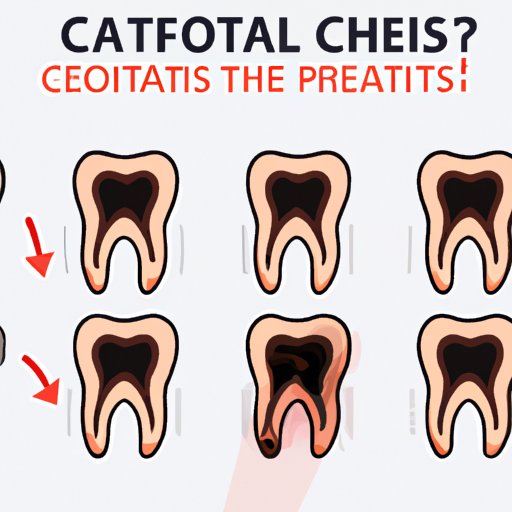
Introduction
Cavities, also known as tooth decay, are a common dental problem that can cause pain, discomfort, and other oral health issues. Identifying cavities early is essential to receiving prompt treatment from a dental professional, so it’s important to know the warning signs. In this article, we’ll discuss the symptoms of cavities, how to self-check for cavities at home, the warning signs that require immediate attention, the importance of regular dental check-ups, risk factors for developing cavities, common causes of tooth decay and cavities, and how to prevent cavities.
Highlighting the Symptoms
Common symptoms of a cavity include sensitivity to hot or cold temperatures, pain when biting down or chewing, visible holes or pits in teeth, and toothache. However, symptoms can vary depending on the location and severity of the cavity, and some people may not experience any symptoms at all.
A Guide to Self-Checking for Cavities at Home
To self-check for cavities at home, grab a mirror and look for any visible holes or pits in your teeth. Pay attention to any sensitivity or discomfort while eating or drinking. If you notice any of these symptoms or visible signs, schedule a dental appointment as soon as possible. Be sure to check all teeth, including hard-to-reach molars.
The Warning Signs You Shouldn’t Ignore
If you experience symptoms such as fever, swelling, or intense pain, seek dental attention immediately. These symptoms may indicate a more serious dental issue than a simple cavity. If you have prolonged toothache or have lost a filling, contact your dentist right away. Trying to self-treat a serious dental issue can lead to more complicated and expensive treatment later on.
Discussing the Importance of Dental Check-Ups
Regular dental check-ups help detect cavities early or prevent them before they happen. A dental professional can remove tartar build-up, clean teeth, check for cavities, and take X-rays to identify potential cavities. It is recommended that you receive a dental check-up twice a year.
Identifying Risk Factors for Developing Cavities
Poor oral hygiene, sugary foods and drinks, and dry mouth are all risk factors for developing cavities, as well as certain medical conditions and medications. Brush at least twice a day and use fluoride toothpaste, limit sugary foods and drinks, and use mouthwash with fluoride to reduce the risk of developing cavities.
A Look at Common Causes of Tooth Decay and Cavities
Tooth decay is caused by bacteria, which interact with food and drink to produce acid that erodes teeth. Foods and drinks high in sugar or acid, such as soda, candy, and juice, can be particularly harmful to teeth.
Conclusion
Tooth decay and cavities can cause pain, discomfort, and other oral health issues. It is important to identify cavities early to receive prompt treatment, and to take steps to prevent cavities from forming. Regular dental check-ups, good oral hygiene, limiting intake of sugary and acidic foods and drinks, and using fluoride can all help prevent cavities or detect them early. Don’t hesitate to contact your dental health professional if you suspect you may have a cavity or other dental issue that needs attention.




